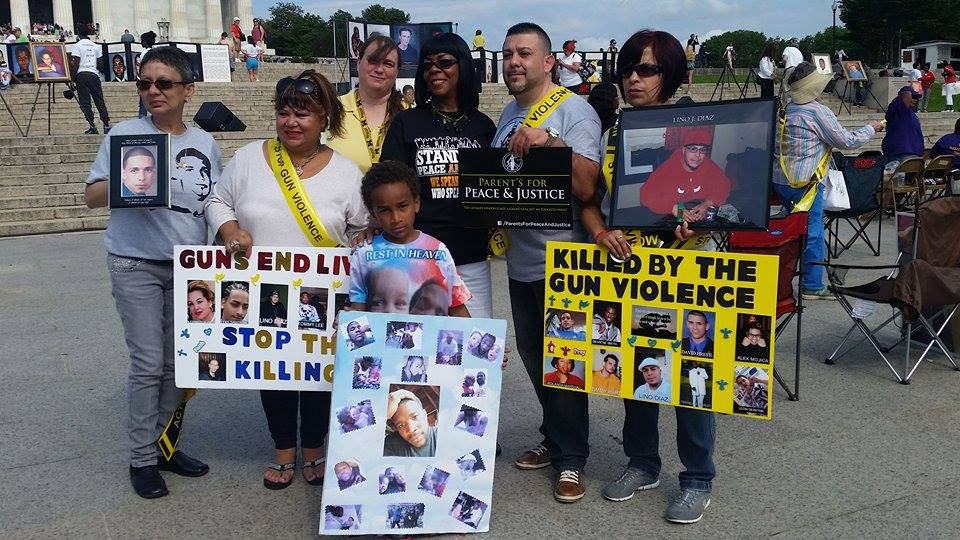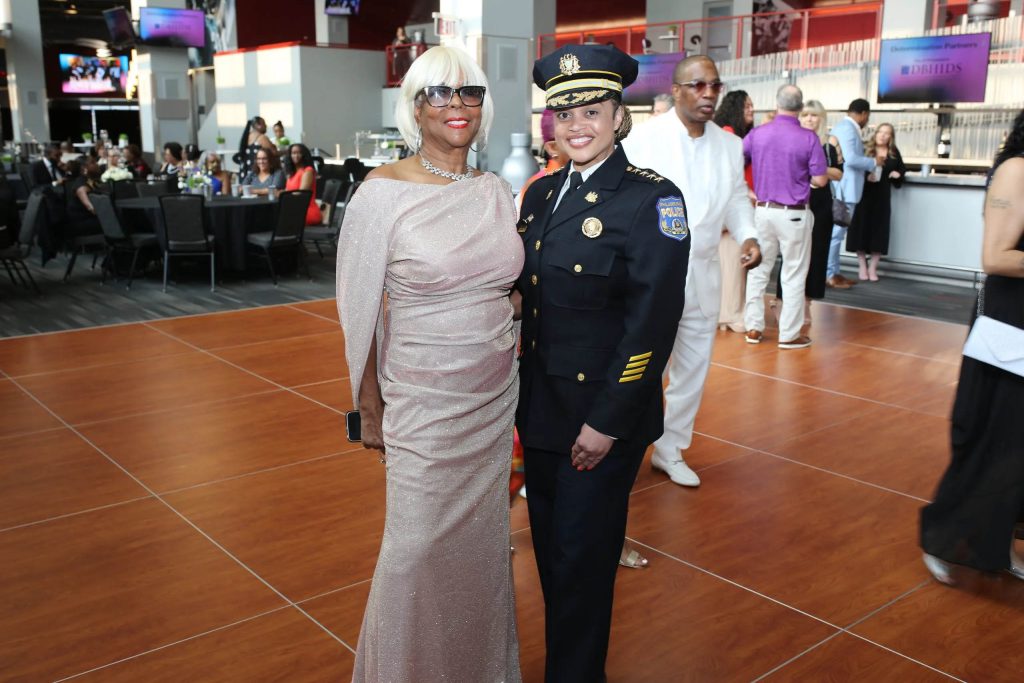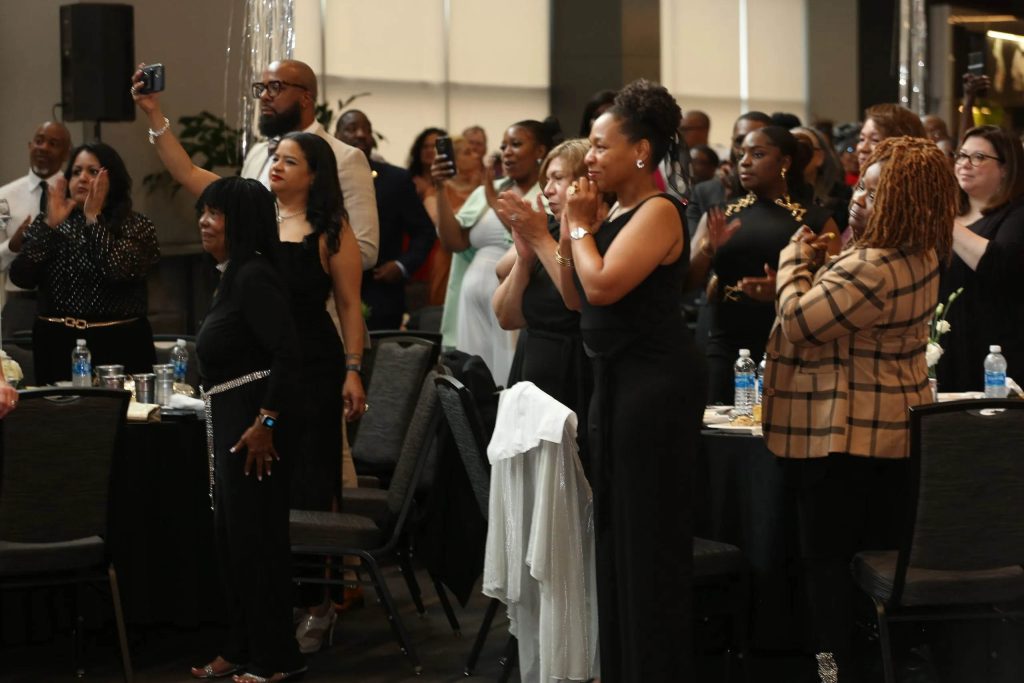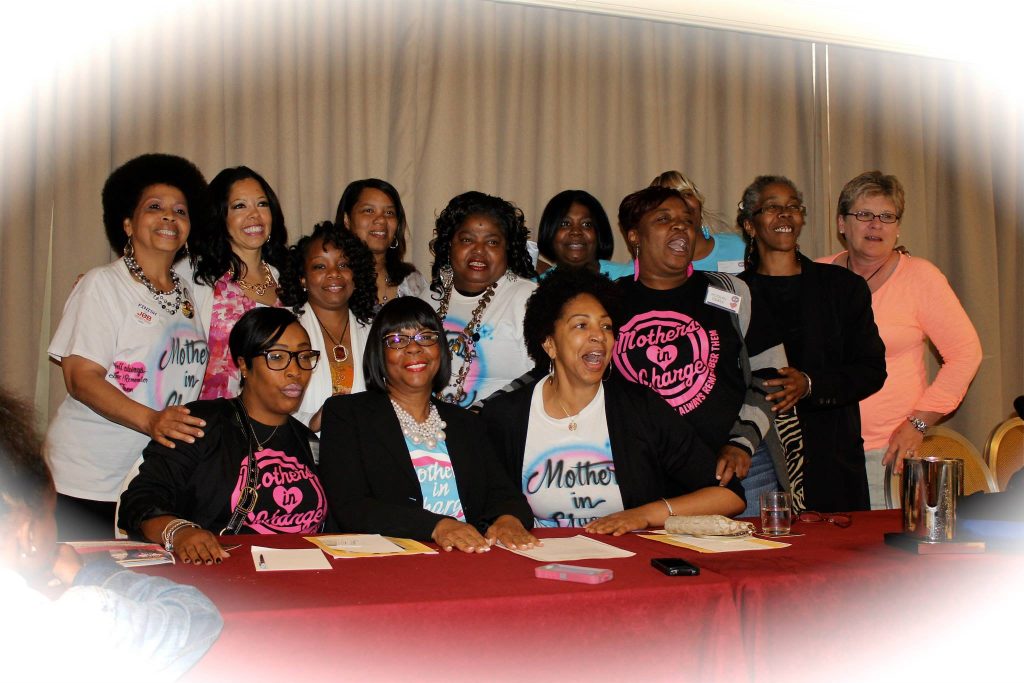
By Constance Garcia-Barrio
ABOVE PHOTO: Standing for Peace & Justice Rally June 2015 at Lincoln Memorial at National Mall, Washington.
Photo sent by Sherry Labadie
Like molding clay studded with thorns, Dorothy Johnson Speight, Ph.D, MHS, LPC, shaped her grief into Mothers in Charge (MIC), a nonprofit that works to prevent violence and help those affected by it to heal. In 2023, MIC, with affiliates in New York, New Jersey, Kansas, and California, celebrated its 20th anniversary.
Johnson Speight worked through profound pain to start MIC.
“My son Khaaliq Jabbar Johnson was murdered over a parking space in 2001,” said Johnson Speight, a licensed family therapist. “A neighbor shot him seven times on a cold December night. He was just 24, working with special-education students at the Pickett School. He was about to start a master’s program in human services. We were going to hang up our shingle together.”

Dr. Dorothy Johnson Speight with former Philadelphia Police Commissioner Danielle Outlaw
at the 20th Anniversary Gala
Photo courtesy: MIC

Attendees celebrating at the 20th Anniversary Gala
Photo courtesy: MIC
Johnson Speight had also journeyed through grief earlier.
“I lost a daughter, age two-and-a-half, to bacterial meningitis,” she said. Like her son, her daughter died in Einstein’s ER.
Those deaths and advanced studies allow Johnson Speight to attend to other bereaved mothers with exquisite care. But that came only in time
“Initially, I self-medicated, and that’s not the answer,” Johnson Speight said. “After you’ve drugged yourself, sexed yourself, and drunk yourself heavily, it’s still here. The grief hasn’t budged. You’ve got to find the right therapist and work through it.”
Johnson Speight said that sometimes our community views seeking help with our emotions as a sign of weakness, however from her perspective, it’s an act of courage.
“You’ve got to be willing to hurt a lot in the beginning, but counseling lets you find your way through grief,” she said. “It allows you to heal.”

The ladies of Mothers In Charge from across the nation conclude their panel discussion at the Sheraton Philadelphia Downtown.
Photo courtesy: MIC
Johnson Speight advises interviewing grief counselors as if screening a job candidate a job. She found Dr. Barbara Pearl, a therapist who had lost a child herself.
“I worked with someone who understood my pain and grief,” Johnson Speight said.
About a year after her son died, Johnson Speight had an unusual experience.
“I had a vision where grieving mothers with bullhorns stood in a boxing ring near 22nd Street and Cecil B. Moore Avenue, the area where I grew up, telling their sons to put down the guns,” she said. “God was tellin’ me what to do with my pain.”
In time, Johnson-Speight began to gather with other grieving women and formed Mothers In Charge.
“We’re mothers, grandmothers, aunts, sisters, and others committed to saving lives so that other mothers won’t have to endure the crushing loss of a child,” said Johnson Speight, executive director of MIC.
Today, MIC offers individual and peer group counseling several times a week, among many other services.
Johnson Speight reminds bereaved adults about the needs of children affected by the death of a loved one. Children’s Hospital of Philadelphia and Jefferson University Hospital have therapists who counsel children, she said. In addition, Uplift Center for Grieving Children provides free peer support groups for children from kindergarten to 12th grade in the Greater Philadelphia region who’ve experienced the death of an important person in their lives. For more information, visit: https://www.upliftphilly.org/.
MIC tackles the issue of deadly violence from different angles, but the strategies boil down to the acronym PIE: prevention, intervention, education.
Anger management leads the field when it comes to preventing violence.
“A lot of what happens on the streets of Philadelphia is due to people who don’t know what to do with their anger,” Johnson Speight said. “Take the man who killed one Macy’s guard and wounded another last month after they threw him out of the store for shoplifting. He may have reacted by attacking them because he was angry about something that happened earlier that morning or the day before. People have nowhere to go with their anger.”
Stephen Austin, a former juvenile lifer who spent 43 years in prison, runs the anger management program. MIC’s program participants meet over nine weeks.
People who’ve taken the course come back and share that what they learned stopped them from committing a crime or being a crime victim, Johnson Speight said.
MIC also intervenes to help set lives on a new path. “Thinking for a Change,” helps prepare people who are incarcerated for re-entry. It gives them tools to make sound decisions when they return to their communities, according to Johnson Speight.
Along similar lines, “Women Working For a Change” assists women who’ve returned home from prison in finding jobs and housing. It also aids them in resolving past traumas and, sometimes, in reconnecting with their children. The women learn skills that will help them avoid returning to prison. Kenyatta Johnson, the new president of City Council, recently presented diplomas to women who graduated from the program.
Education is a crucial part of MIC’s work. Johnson Speight developed a class with the acronym LIPSTICK (Ladies Involved in Putting a Stop to Inner City Killing.)
“We educate young women about the perils of making a straw gun purchase,” Johnson Speight said. “Say, a man tells his girlfriend that he loves her, and since she has no [criminal] record, she can buy a gun for him. He may say he needs to carry a gun for protection on the street. But if a crime is committed with that gun, the young woman does the [prison] time. I see cases like this at Muncy [State Correctional Institution].
MIC also advises about rights available to them under VOCA (the Victims of Crime Act). In addition, MIC’s Participatory Defense Team helps guide people who have court cases. The organization’s handbook, “Enough Is Enough: Community Violence Prevention Resource Guide,” available online, contains a wealth of information.
While MIC held a gala anniversary celebration last year, Johnson Speight looks to accomplish still more in 2024.
“We’ll renew our emphasis on young people,” she said. “We have a mentoring program,” she said, picking up a copy of “Mental Health for Teens: a Workbook for Self-discovery, Self-esteem, and Confidence,” a book used in mentoring. “We hope to return to Philadelphia schools.”
MIC aims to continue healing the city, but that’s a tall order, Johnson Speight said.
“We need support from the community — volunteering as well as donations,” she said. “Many of our programs aren’t funded, and there’s so much to do.”
Mothers In Charge is located at 990 Spring Garden Street, Suite 703. To volunteer or make a donation, please visit: https://www.mothersincharge.org/ or call: (215) 228-1718.
















Leave a Comment